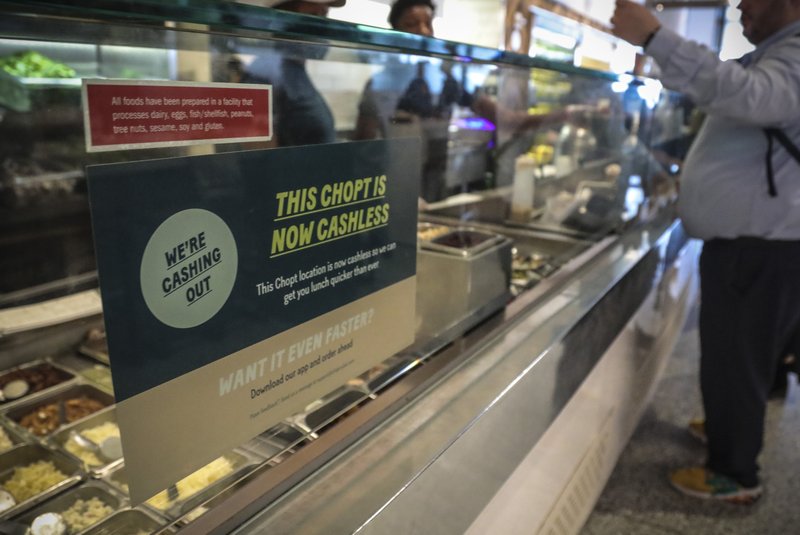NEW YORK -- New York City lawmakers voted Thursday to require stores and restaurants to accept cash for payment, saying businesses that accept only credit and debit cards are discriminating against New Yorkers who lack bank accounts and credit cards.
"This practice punishes the underbanked," City Council Speaker Corey Johnson said before the council's 43-3 vote in favor of the bill.
Under the bill, businesses that refuse cash will be fined $1,000 for the first violation and $1,500 after that. The measure, which is expected to go into effect by the end of the year, also prohibits stores from charging higher prices for paying in cash.
Democratic Mayor Bill de Blasio is expected to sign the legislation. A spokeswoman for the mayor said that he supports the intent of the bill but that his administration will review it.
For many people, it is simply more convenient to buy something with a swipe or a tap. Businesses that refuse cash say it is faster and easier for workers to process digital payments and keep customer lines moving. Fans of the cashless approach also say it spares employees from mundane tasks like counting money and limits the danger of robbery.
But critics of cashless businesses say hundreds of thousands of city residents don't have bank accounts or credit cards and that others simply prefer to use cash or fear hackers who steal personal data tied to digital transactions.
The city's Department of Consumer Affairs said last year that 1 in 9 New York households did not have a bank account, and that 1 in 5 were "underbanked," meaning they had a checking or savings account but relied on something other than a bank to cash a check. Bronx households, the agency said, were around twice as likely not to have a bank account.
In adopting the ban on cashless businesses, New York City joins a growing backlash against the digital-only economy.
Philadelphia became the first U.S. city to ban cashless stores last year, despite opposition by retail giant Amazon. San Francisco and New Jersey passed similar measures soon after. Only one jurisdiction required businesses to accept cash before 2019: Massachusetts, which passed a law nearly 40 years ago. Chicago is among the cities that is now considering its own ban on cashless businesses.
But New York City officials have also targeted ride-sharing and meal-delivery apps, as well as facial recognition for building entries -- all in an effort to blunt the impact of advancing technology on those who are unable or unwilling to use it.
"Whatever your reasons, consumers should have the power to choose their preferred method of payment," City Councilman Ritchie Torres, the Bronx Democrat who sponsored the legislation, said before the council's vote.
Councilman Kalman Yeger, a Brooklyn Democrat, said that businesses should accept cash but that the local government shouldn't force them to.
"We're inserting ourselves into the business of business in a way that we don't have a right to do in my opinion," he said in explaining his "no" vote.
But some businesses that will be affected by the no-cash ban said they will follow the law when it is enacted.
"We are proud to do business in NYC and will of course comply with all NYC laws and statutes," Nick Marsh, chief executive officer of Founders Table, parent company of the Chopt Creative Salad Co. and Dos Toros Taqueria chains, said in a statement.
A company spokeswoman said six of New York City's 18 Chopt locations and all of its 17 Dos Toros locations are currently cashless.
The National Retail Federation, a trade group, has taken the position that "retailers should have the right to choose which payments to accept and to decide for themselves whether going cashless makes sense for their businesses," according to a statement by Stephanie Martz, the group's general counsel.
Beyond that, Martz said, measures like the one in New York City were "a solution in search of a problem since cashless stores are fairly uncommon." Still, a report from the Federal Reserve Bank of San Francisco cited by the federation showed the portion of transactions made in cash falling to 30% in 2017 from 40% in 2012.
Mary LeSage, waiting to buy lunch at a Chopt counter in Manhattan on Thursday, said the cashless policy is efficient but she agrees that it might be discriminatory.
"It's an ease of use sort of thing, to make it go faster," LeSage said. "I've seen this line go all the way around there. But on the other hand, I do think it's wrong to bar people from food because they don't have the necessary resources. If it takes me five minutes longer to get lunch, that's fine if it means everyone can get food."
Information for this article was contributed by Karen Matthews of The Associated Press and by Ed Shanahan and Jeffery C. Mays of The New York Times.
Business on 01/25/2020

